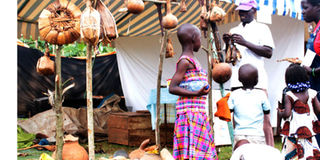Timeless lessons at culture fair

The culture stall had a lot of information, especially for young minds with questions about what it means to be a Muganda.
What you need to know:
Culture. Such festivals will forestall a catastrophe where future generations do not know their roots.
We all were morbidly fascinated as the two caged green mambas danced across each other’s slithery bodies. This was at the reptile’s stall at the Buganda cultural show that started on November 30 and will end on December 9 at the Saza headquarters in Mukono District’s Ggulu Zone.
Going in, I half-expected to find a cultural-festival atmosphere instead of the trade-show one. But the stalls specifically devoted to Buganda cultural artifacts, though greatly outnumbered by those selling modern merchandise, were a pleasant surprise.
The purpose of my visit, the Buganda culture stall, was located immediately after the guards’ frisking area. The attendants proved to the few who bothered to stop that their near-encyclopedic knowledge of Buganda’s cultural aspects both belied and compensated for their exhibition’s inadequacy in size and range of cultural artifacts on show.
History come alive
It seemed paradoxical that the cultural stall was not the most popular one at what was dubbed a Buganda Cultural Show.
But as guide Kojja Mpirivuma explained, this in itself is a core reason for hosting the show.
“We need to revive the public interest in Buganda’s cultural heritage. Otherwise, we risk future generations not knowing or appreciating the role of say the kyoto (fireplace) as the traditional school, dispute- arbitration bureau, and story-telling center,” he enthused.
The tour encompassed elements of Buganda traditional homestead settings, medicinal food and herbs, as well as etiquette lessons from a Ssenga, who complimented his lecture. Also on offer were Omusese Mpalanyi Mugalula Kimera’s CD’s on Luganda diction, and the herbal medicine the kojja derives his business name from.
In Kojja Mpirivuma’s opinion, the idea is that such shows will ignite a renaissance of traditional culture, which will transfer heritage from its current museum-like status to a living, present entity. “Cultural practices have inherent positive values which are necessary to reverse the trend of mal-adjusted parents and children we see today,” he said.
In time, perhaps the cultural stalls at such shows will significantly compliment other avenues for marketing Buganda’s cultural heritage. They include the ekisaakaate organised by the Nnaabagereka, which this year ran under the theme “Culture is Critical to Development,” and popular Luganda literacy programmes like Radio Simba’s recently-concluded Engule competition.
Beyond the culture
Heritage seemed relatively boring, thus people came mostly for the exotic fun and games. It was evident that at nightfall, drunken revelry and concerts would take over from the street-casino artists, craft vendors, and Uganda Reptile Village’s motley collection of crawlies.
But by daylight, the highlights were stroking a 250-year old tortoise, watching a handler playfully poke his lethargic cobras into alertness, and listening to laymen debate mythology about the abilities of imported guard dogs of classic pedigree.
A mandazi-vending kid lost heavily when playing kolokolo (double-your-money).
He led himself into temptation and the dealer, needing to make up Shs100,000 he had earlier lost to a lucky reveler, afforded no mercy.
After losing twice consecutively, I walked away before hopeful greed could get the better of me.
Later, my jam session with the African Beat cultural group was halted by security on grounds of “noise unbecoming.”
Hopefully, tomorrow when Buganda’s Katikkiro (Premier) Engineer John Baptist Walusimbi goes to close the show, drums will have license. Beyond tomorrow the hope is culture will match trade and entertainment which, set the agenda all week long.




